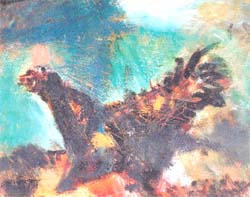Cocktale
 As the red jungle fowl started travelling across the globe, its connections to different aspects of human life also grew. It assumed the responsibility of sounding the wake-up call to humans. Because of this role, it was regarded as the Herald of Dawn and the guardian of good over evil in Zoroastrian. The call of the fowl means liberation from darkness. So profound was the veneration that by 1000 BC Zoroastrianism forbade the eating of the fowl. In Christian religious art, the crowing cock symbolised the resurrection of Christ. It was also the emblem of the first French Republic.
As the red jungle fowl started travelling across the globe, its connections to different aspects of human life also grew. It assumed the responsibility of sounding the wake-up call to humans. Because of this role, it was regarded as the Herald of Dawn and the guardian of good over evil in Zoroastrian. The call of the fowl means liberation from darkness. So profound was the veneration that by 1000 BC Zoroastrianism forbade the eating of the fowl. In Christian religious art, the crowing cock symbolised the resurrection of Christ. It was also the emblem of the first French Republic.
The Yoruba people of West Africa believe that the chicken made land on earth. As the story goes, the Sky God lowered his son Oduduwa and a five-toed chicken down a great chain from the heavens to the ancient waters. Along with the chicken, Oduduwa had a handful of dirt and a palm nut. He threw the dirt on the water. The chicken busily scratched and scattered the dirt all around until it formed the first dry land on earth.
In India, too, there are many beliefs and tales on the bird. One among them is the story of Goddess Kamakhya and the demon that wished to get wedded to her. He threatened mass destruction if she refused him. She then put a condition before him. Underestimating the demon's capability, he was asked to build a temple overnight and the next morning she would be his. The demon got down to work and was in the process of finishing the temple much before dawn. Seeing that her trick did not work, she asked her trusted fowl to crow. Just before the last few bricks were to be laid, the fowl gave a full-throttled crow. And declared the arrival of dawn. The temple was left incomplete and the goddess was spared the ignominy of marrying a demon. The temple is now one of the most sacred pilgrimage sites and is located in Guwahati, Assam.
These are only a few stories about the fowl's liaison with deities and lesser mortals.
